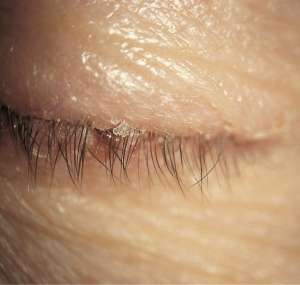Itching & Inflamed Eyelids Itchy eyes, dry skin? Read On:Many people suffer itchy, dry and inflamed skin around the eyes and particularly the eye lids and their margins needlessly. If this sounds familiar and you, or someone close to you, has this problem then you need look no further for the answer. Spectrum Thea provide eye treatments that are dedicated to the treatment of eye health care problems. Eye care professionals endorse and use their products in special Dry Eye Clinics up and down the country. What is Blepharitis and How can I treat it?Blepharitis refers to inflammation of the eyelids. Oils and other products normally secreted by the eye and eyelids build up on the lid surface and eyelashes resulting in eye irritation and often redness. It is a common disorder which can affect anyone at any age, although older people are at increased risk. People with the following conditions are predisposed: ◦ Dandruff or dry skin conditions Blepharitis may be controlled but not cured and treatment depends on the type of blepharitis you have. It may include applying warm compresses to the eyelids, cleansing them, using an antibiotic and massaging the lids. If your blepharitis makes your eyes feel dry (usually because your tears evaporate more quickly) you may be recommended to use artificial tears. The importance of eyelid cleansingCleansing the eyelids is essential to blepharitis treatment. When you first begin treatment you may have to cleanse your lids several times a day. When the eyes feel better from the lid hygiene (usually after about 3 weeks) treatment can be done once a day. Remember, if you stop treatment altogether it will probably result in a recurrence of problems. Only regular lid hygiene will keep the blepharitis under control. Previously, the most common method of lid hygiene involved baby shampoo diluted with pre-boiled, cooled water. This was complicated and time consuming to prepare and is not what this product was intended for meaning an increased risk of adverse reactions such as stinging and irritation.It actually worsened the situtaion so don’t let anyone tell you otheriwse…even the mediacl profession! Now there are products available specifically developed for eyelid hygiene and blepharitis.The products work by a process called adsorption which lifts oily debris allowing it to be removed with gentle wiping. There is no need to scrub the eye lids which could lead to further damage.
|
Welcome to My Local Optician for all those who want to look good and see well and hear easily. Find the best Optician for you and read about staying healthy.
Published by Primary Health Net Ltd
(PHN)
All rights reserved 2006-2023
-
0
Basket
- Home
- Latest News
- What is an eye examination?
- Types of registered professionals
- Why UK Optometry leads the world
- NHS Entitlements
- Private Charges and Payment Plans for Eye Tests and Examinations
- How often should I have an eye test with the optician?
- Eye Tests at Home
- Modern Day 21st Century Roles of the Optometrist
- Extended Eye Examinations
- Advanced Retinal Examination
- Community Enhanced Services provided at the Opticians
- Special Treatments for Better Vision
- Eye Health
- Sight and Sound Charities List
- The Birdshot Uveitis Society (BUS)
- CamSight
- Childhood Eye Cancer Trust CHECT
- Eye Heroes
- Fight for Sight
- Insight Extra Radio
- Lip Reading Practice Online
- MACS The Micro and Anophthalmic Children’s Society
- Optometry Giving Sight
- ORBIS
- Retina UK
- Sight Aid International
- Surrey Association for Visual Impairment
- Vision Care for Homeless People VCHP
- Wiseman Memorial Fund
- Find Your Local Optician
- My Local Optician Shop
- About Us
- Login
- Register



















